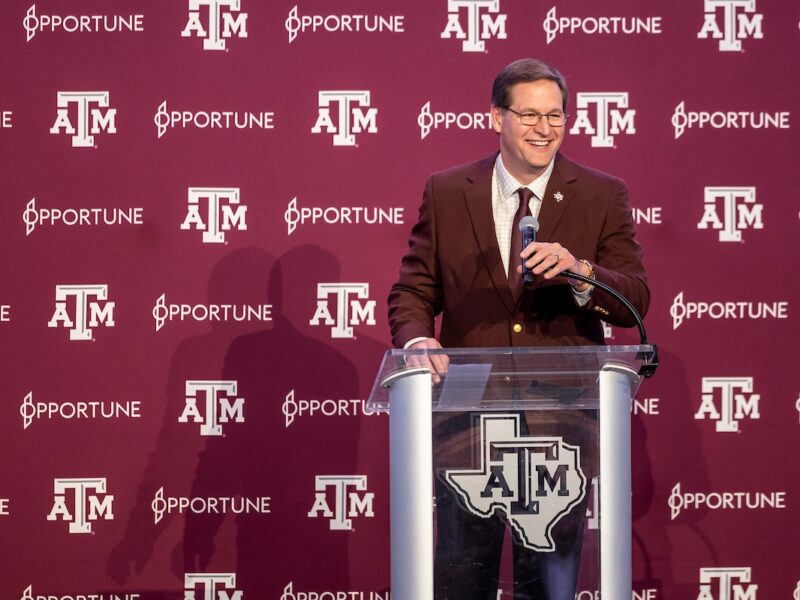For Sports Employees, Work-Life Balance Is A Challenge

When competition is at the core of your job, how do you manage a healthy work-life balance?
Sport management expert Marlene Dixon of Texas A&M University’s Department of Health and Kinesiology sought to answer this question after experiencing difficulty balancing both coaching and family in her own life.
“My longtime coauthor and I started to notice that many of our other colleagues were also struggling to balance coaching and a family, even to the point of quitting coaching,” Dixon said.
Through her Sport and Life Quality research group, Dixon and colleagues identified that parent coaches, coaches, elite athletes, front office staff and other sport employees typically struggle to maintain a healthy work-life balance.
“Although competition is not unique to sport, because of the public nature of sport, it certainly plays a role in amplifying the stress that sport employees feel,” Dixon said.
Dixon said sport employees have a tangible, public product compared to other high-stress professions which adds additional pressure to their already intense jobs. For instance, after just one bad game, fans on social media may publicly call for a coach’s removal.
Division I head coaches are expected to be coaches, fundraisers and the face of the organization, and maintain the health and wellbeing of assistant coaches and players, all on top of managing their home life.
“There is just not enough time in the day for coaches in this ridiculously broadly-defined role,” Dixon said.
However, while Division I coaches have larger staffs to help balance these expectations, Division II and II do not and are typically expected to take on just as much. Dixon advises schools base expectations on current staff support or hire more staff support to avoid turnover in coaching positions caused by lack of healthy work-life balance.
Dixon said the saturated labor market is also to blame in the stress that sport employees feel.
“What we hear from a lot of employees is that they feel if they don’t do this job and do it well, there are one hundred more people standing right behind them ready to take their job,” Dixon said.
Dixon said the most surprising finding in this area is the sheer prevalence of stress among sport employees regardless of gender or position.
“It is surprising that this is a battle literally for everyone who works in the sport profession,” Dixon said. “And it is not just about work-family balance, it is about work-life balance.”
Dixon said the stress is also there for those with aging parents, and single employees trying to find an outlet or free time beyond work. She consulted mid-career and late-career coaches to understand how sport employees can find a healthy balance. Their response was that it is possible to “have it all,” but it requires intentional scaffolding of support systems both in work and home life.
Dixon said the introduction of mandated time off for coaches has been helpful in alleviating stress while protecting teams from a competitive disadvantage.
“One of the reasons that coaches in particular drive so hard is because there is this sort of keep up with the Joneses mentality, and that the other guy is going to outwork you,” Dixon said.
Dixon hopes to continue researching the issues that sport employees face. She plans to take a deeper look into the burnout that occurs from working both in paid and unpaid roles, otherwise known as the traditional job setting and the mandatory tasks in a home that are not leisure activities.
Dixon has been a sport management researcher for 20 years. She was recently awarded the Earle F. Zeigler Lecture Award from the North American Society for Sport Management. The award is a top recognition in sport management, honoring scholars who have made substantial contributions in research, teaching and service.
“This award is meaningful because it represents 20 years of a collaborative contribution to sport management and to people’s lives,” Dixon said. “So, it represents a whole collection of stories, and relationships, and adventures; of wins and rejections and overcoming challenges; of creative thinking and growth and enjoyment in the process.”
Dixon is also being honored at the upcoming Center for Sport Management Research and Education Research Symposium, where she will discuss her research and award with fellow sport management scholars.
“Her work on creating access for girls and women in sport, coupled with her scholarship in the area of work-life balance, have advanced sport management in meaningful ways. She is a true leader in the field,” said Dr. George Cunningham, director of the Center for Sport Management Research and Education.
The symposium, which is open to the public, will be held via Zoom on Mar. 25 at 1 p.m. CST. Register by emailing gbcunningham@tamu.edu.
This article by Heather Janak originally appeared on the College of Education & Human Development website.





